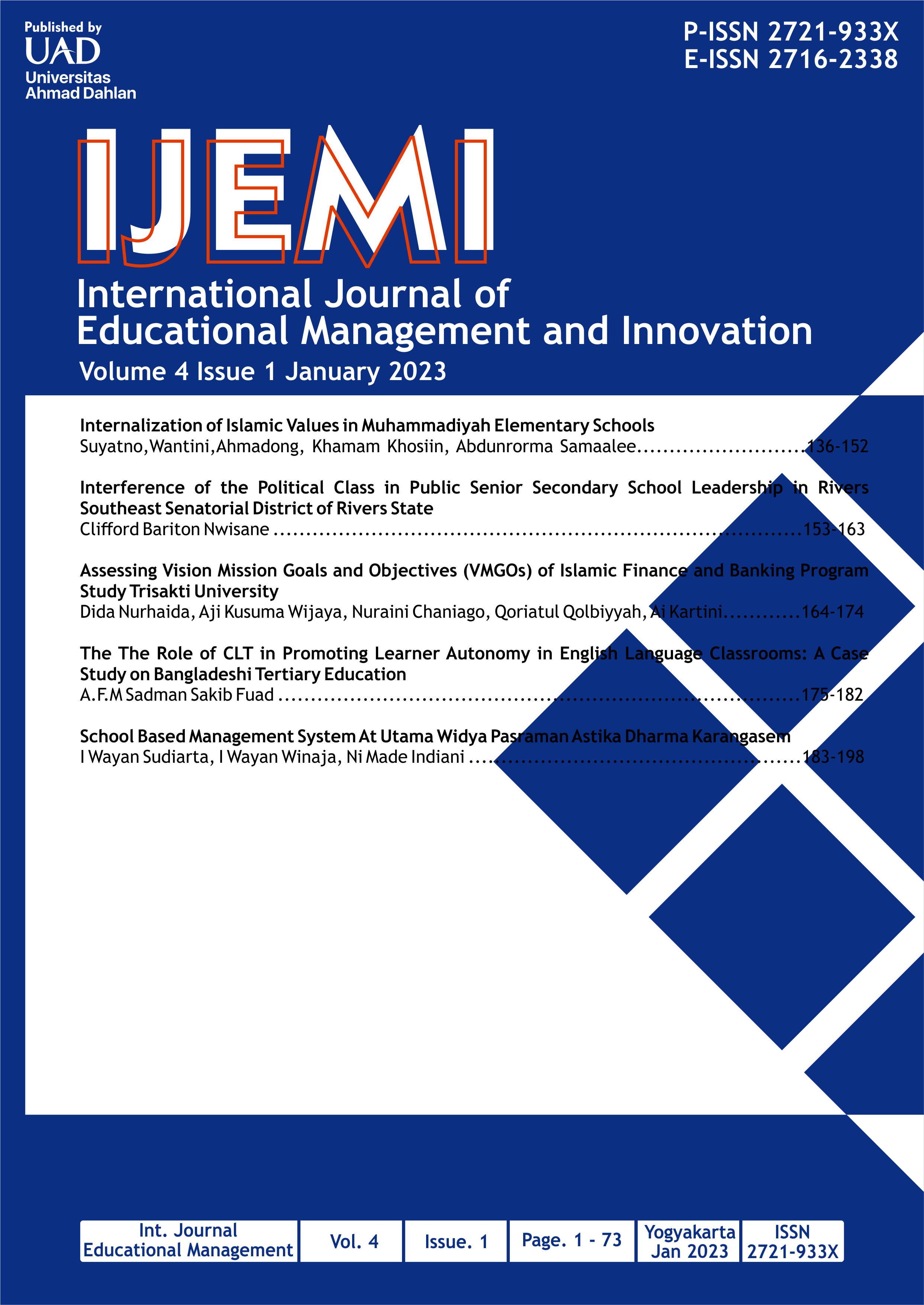Interference of the Political Class in Public Senior Secondary School Leadership in Rivers Southeast Senatorial District of Rivers State.
EDUCATIONAL MANAGEMENT
DOI:
https://doi.org/10.12928/ijemi.v4i1.6598Keywords:
Interference, Political Class, LeadershipAbstract
This study focuses on the Interference of the Political Class in Public Senior Secondary School Leadership in Rivers southeast Senatorial District of Rivers State. The study adopted a Descriptive research design. The population comprised 234 respondents (78 Principals, 78 Vice Principal Administration, and 78 Academics. Census was used to select the population. The questionnaire was used for data collection. The reliability of the instrument was obtained using test-retest method statistics. Twenty senior secondary school principals were administered the questionnaire, and a reliability index of 0.739 and 0.81 was obtained through Pearson Product Moment Correlation statistics. Mean and standard deviation was used to answer research questions 1-4, while an independent t-test was used to test the hypotheses at a 0.05 alpha significance level. The findings showed no significant difference between the mean ratings of principals and vice principals in the interference of politics on the appointment, promotion, posting of staff personnel, etc. From the findings, the study concludes that government should come up with acceptable criteria for appointing principals to ensure proper management of the schools, and the government should support the in-service training of staff to ensure teacher competency.
References
Adiele, E. E. (2020). Educational leadership and policy: Theory and practice. Pearl Publishers.
Agi, U. K. & Adiele, E. E. (2009). Educational management. Rodi Printing and Publishing.
Agi, U. K., Kalagbor, L. & Anthony, H. (2016). Politics of educational leadership: Its implications for secondary school improvement in Rivers State. Journal of Education and Practice.http://iiste.org/https://files.eric.ed.gov/fulltext/EJ1109420.pdf.
Ajaye, A. O. (ND). Impact of politics on Nigerian education. Unpublished Micrograph and Development Council Federal Republic of Nigeria Gazette, 66(91), 113–124.
Cherry K. (2020).The Situational Theory of Leadership.https://www.verywellmind.com/whatisthesituational-theory-of-leadership-2795321
Ikegbusi, N. (2014). Leadership in educational sector and government interest. University Press.
Indeed Editorial Team (2021). Situational Leadership Theory: Definition, Styles , and Maturity. https://www.indeed.com/careeradvice/career development/situationalleadership-theory
Koko, M. N. & Nwiyi, G. U. (2019). Educational management: A practical perspective. Pearl Publishers.
Lenshie, N. E. (ND). Corruption, democracy and national development in Nigeria. Ahmadu Bello University Press.
Nwabueze, I., Odum, I. A. & Nwabueze, F. I. (2016). Politics and politicking in administration of secondary schools in Nigeria: A social synopsis. International Journal on Academic Discourse 9(1), 30-316.
Nwankwoala, H. N. L. (2016). Fundamental facts in educational administration and supervision. Harey Publications.
Nwiyi, G. U. (2019). Managerial psychology and educational leadership. Harey publications.
Oboegbulem, A. I. (2003). Fundamentals in educational administrations and planning. Magnet Business Enterprise.
Ogbonnaya, N. O. (2019). Social and political contexts of educational administration and planning. Chuka Educational Publishers.
Ogunu, M. (2000). Introduction to educational management. Mabogun Publishers.
Okeke, B. S. (2017). Politics of education: The Nigeria experience. Doone Printing & Publishing.
Ololube, P. N. & Nwiyi, G. U. (2019). Encyclopaedia of institutional leadership, policy and management. Pearl Publishers.
Ololube, P. N. (2013). Educational management, planning and supervision: Model for effective implementation. Springfield Publication. https://www.researchgate.net/publication/282980192_Educational_management_planning_and_supervision_model_for_effective_implementation.
Owhondah, S. N. (2020). Basic issues in educational management. Dabak flamboyant Printing & Publishing.
Rabarison K., Ingram R. & Holsinger J. (ND). Application of situational leadership.
https://www.frontiersin. org/articles/ 10.3389/fpubh.2013.00026/full
Samphina Academy. (N.d). The influence of politics on the management of secondary school in Nigeria. https://samphina.com.ng/influence-politics-management-secondary-school-nigeria/.
Downloads
Published
How to Cite
Issue
Section
License
Copyright (c) 2023 Universitas Ahmad Dahlan

This work is licensed under a Creative Commons Attribution-ShareAlike 4.0 International License.
The copyright to this article is transferred to Universitas Ahmad Dahlan (UAD) if and when the article is accepted for publication. The undersigned hereby transfers any rights in and to the paper including without limitation all copyrights to UAD. The undersigned hereby represents and warrants that the paper is original and that he/she is the author of the paper, except for material that is identified as to its source, with permission notices from the copyright owners where required. The undersigned represents that he/she has the power and authority to make and execute this assignment.
We declare that:
This paper has not been published in the same form elsewhere.
It will not be submitted anywhere else for publication before acceptance/rejection by this Journal.
Copyright permission is obtained for materials published elsewhere and which require this permission for reproduction.
Furthermore, I/We hereby transfer the unlimited rights of publication of the above-mentioned paper in whole to UAD. The copyright transfer covers the exclusive right to reproduce and distribute the article, including reprints, translations, photographic reproductions, microform, electronic form (offline, online), or any other reproductions of similar nature.
The corresponding author signs for and accepts responsibility for releasing this material on behalf of any and all co-authors. This agreement is to be signed by at least one of the authors who have obtained the assent of the co-author(s) where applicable. After submission of this agreement signed by the corresponding author, changes of authorship or in the order of the authors listed will not be accepted.
Retained Rights/Terms and Conditions
Authors retain all proprietary rights in any process, procedure, or article of manufacture described in the Work.
Authors may reproduce or authorize others to reproduce the Work or derivative works for the authors' personal use or for company use, provided that the source and the UAD copyright notice are indicated, the copies are not used in any way that implies UAD endorsement of a product or service of any employer, and the copies themselves are not offered for sale.
Although authors are permitted to re-use all or portions of the Work in other works, this does not include granting third-party requests for reprinting, republishing, or other types of re-use.




